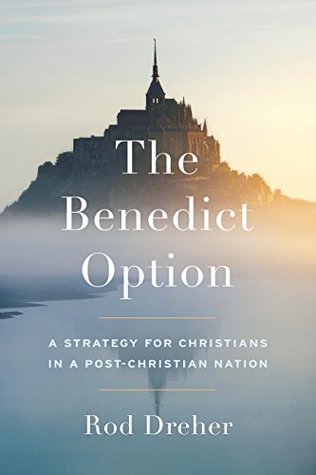More on this book
Community
Kindle Notes & Highlights
by
Rod Dreher
Read between
February 9 - February 21, 2018
Work is not something I do in order to get something. Doing it is good for me, it’s constitutive of my happiness, because in it and through it I show love for others.
“It’s a lot easier to help people to see their own goodness and then bring them in than to point out how bad they are and bring them in.”
The church’s mission on earth is not political success but fidelity.
In the most basic philosophical sense, though, politics is the process by which we agree on how we are going to live together.
You have to want to do something because it’s worth doing, not because you think it will make the Communist Party fall in four years.”
Ceasing to believe that the fate of the American Empire is in our hands frees us to put them to work for the Kingdom of God in our own little shires.
If today’s churches are to survive the new Dark Age, they must stop “being normal.” We will need to commit ourselves more deeply to our faith, and we will need to do that in ways that seem odd to contemporary eyes. By rediscovering the past, recovering liturgical worship and asceticism, centering our lives on the church community, and tightening church discipline, we will, by God’s grace, again become the peculiar people we should always have been.
“Contemporary worship manipulates. God is not a fad or a hipster deity. To attach him to our own little slice of popular culture fails to do justice to him as the transcendent God over all history and cultures.”
“Apologetics then and now has a limited role,” Robert Louis Wilken, the early church historian, has said. “We must speak what is true, but finally the appeal must be made to the heart, not the mind. We’re really leading people to change their love. To love something different. Love is what draws and holds people.”12
“We were not called to be isolated materialists disengaged with neighbors and accumulating things in our castles,”
I am a college-educated American. In all my years of formal schooling, I never read Plato or Aristotle, Homer or Virgil. I knew nothing of Greek and Roman history and barely grasped the meaning of the Middle Ages. Dante was a stranger to me, and so was Shakespeare. The fifteen hundred years of Christianity from the end of the New Testament to the Reformation were a blank page, and I knew only the barest facts about Luther’s revolution. I was ignorant of Descartes and Newton. My understanding of Western history began with the Enlightenment. Everything that came before it was lost behind a misty
...more
Technology itself is a kind of liturgy that teaches us to frame our experiences in the world in certain ways and that, if we aren’t careful, profoundly distorts our relationship to God, to other people, and to the material world—and even our self-understanding.
For Technological Man, choice matters more than what is chosen. He is not much concerned with what he should desire; rather, he is preoccupied with how he can acquire or accomplish what he desires.
But we see that becoming a disciple of Christ is about submitting to formation, not absorbing information.


